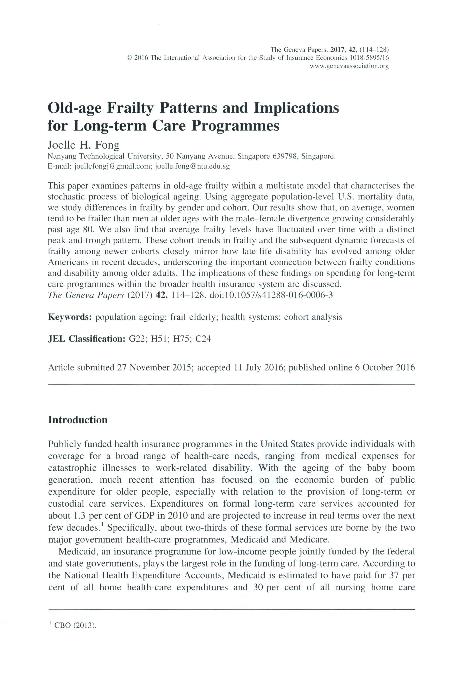Old-age frailty patterns and implications for long-term care programmes

Contenido multimedia no disponible por derechos de autor o por acceso restringido. Contacte con la institución para más información.
| Tag | 1 | 2 | Valor |
|---|---|---|---|
| LDR | 00000cab a2200000 4500 | ||
| 001 | MAP20170005261 | ||
| 003 | MAP | ||
| 005 | 20170309113003.0 | ||
| 008 | 170216e20170102deu|||p |0|||b|eng d | ||
| 040 | $aMAP$bspa$dMAP | ||
| 084 | $a344.1 | ||
| 100 | $0MAPA20150009159$aFong, Joelle H. | ||
| 245 | 1 | 0 | $aOld-age frailty patterns and implications for long-term care programmes$cJoelle H. Fong |
| 520 | $aThis paper examines patterns in old-age frailty within a multistate model that characterises the stochastic process of biological ageing. Using aggregate population-level U.S. mortality data, we study differences in frailty by gender and cohort. Our results show that, on average, women tend to be frailer than men at older ages with the malefemale divergence growing considerably past age 80. We also find that average frailty levels have fluctuated over time with a distinct peak-and-trough pattern. These cohort trends in frailty and the subsequent dynamic forecasts of frailty among newer cohorts closely mirror how late-life disability has evolved among older Americans in recent decades, underscoring the important connection between frailty conditions and disability among older adults. The implications of these findings on spending for long-term care programmes within the broader health insurance system are discussed. | ||
| 650 | 4 | $0MAPA20080587123$aProgramas sociales | |
| 650 | 4 | $0MAPA20100044407$aPersonas mayores | |
| 650 | 4 | $0MAPA20080568771$aEnvejecimiento | |
| 650 | 4 | $0MAPA20080557799$aDependencia | |
| 650 | 4 | $0MAPA20080594794$aAsistencia sanitaria | |
| 773 | 0 | $wMAP20077100215$tGeneva papers on risk and insurance : issues and practice$dGeneva : The Geneva Association, 1976-$x1018-5895$g02/01/2017 Volumen 42 Número 1 - enero 2017 , p. 114-128 |

